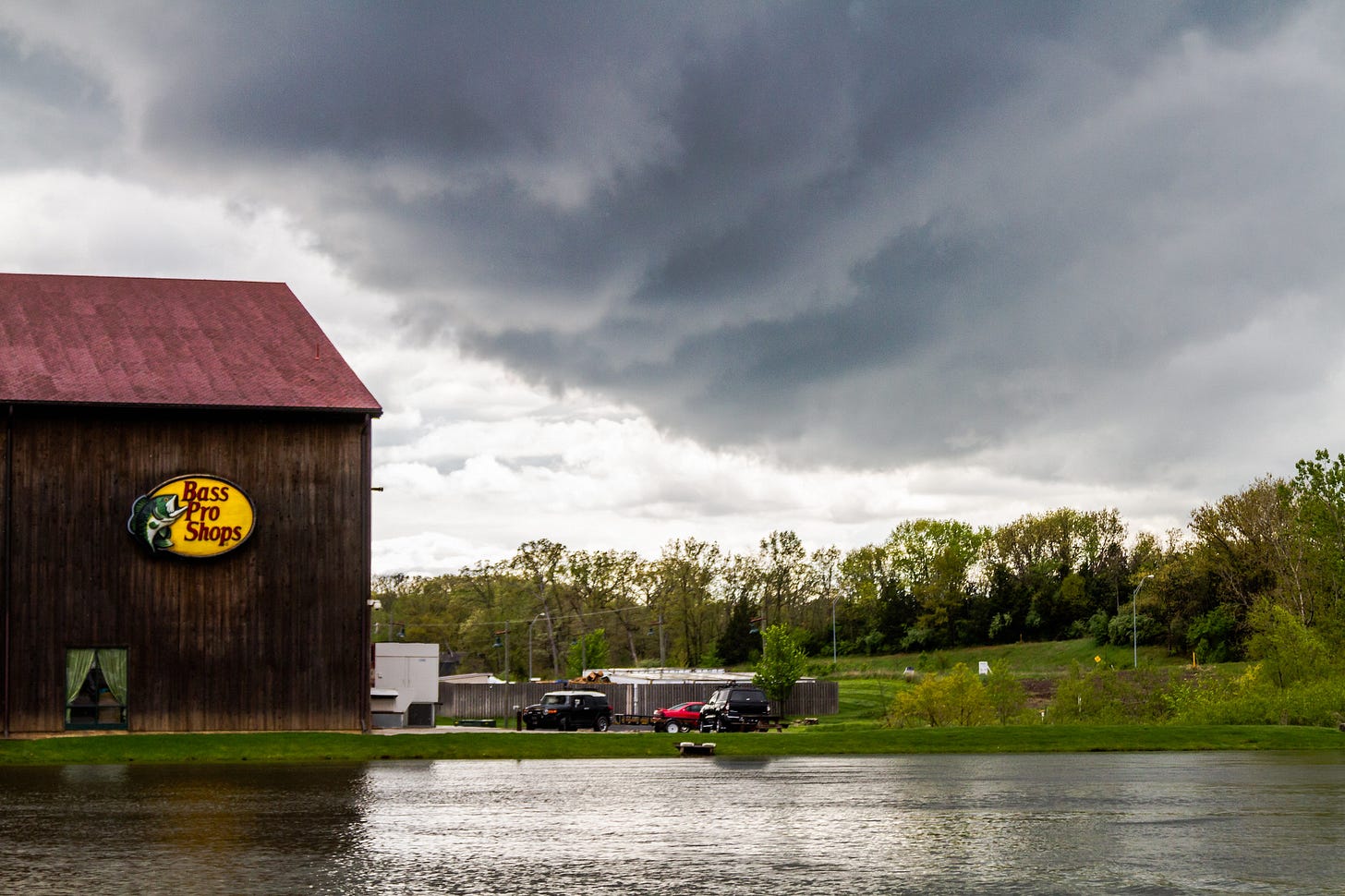Hook, Line, and Sinker
How Bass Pro Shops and antitrust enforcers failed communities.

This is Boondoggle, the newsletter about corporations ripping off our states and cities. If you’re not currently a subscriber, please click the green button below to sign up. Thanks!
Independence, Missouri, has an issue: Back in 2004, it sold more than $70 million in bonds in order to finance a new development anchored by a Bass Pro Shops, one of those mega-sized outdoors goods stores. But as occurs so often when localities bank on shopping as an economic driver, revenues from the development didn’t meet expectations. When bond payments were due, Independence was forced to flail.
For a few years, the city dipped into its general fund to cover the payments, meaning taxpayer money that could have paid for public services was instead supporting the development of a sporting goods store. After a couple of rounds of refinancing, things got better, but the post-pandemic projections look, well, ugly:
From 2024 through 2029, the scheduled payments exceed project revenues — by about $2 million at least. In 2029 the projected difference is about $7 million. Starting in 2030, the scheduled payments dip below projected revenues.
Independence’s total municipal budget is around $300 million, so this isn’t chump change; it’s planning another refinancing, but it may very well wind up right back in the same spot in a few years, throwing good money after bad to support a giant store and the development it was supposed to generate.
Independence isn’t alone in finding itself in some trouble after subsidizing Bass Pro Shops. The company has made a habit of extracting resources from taxpayers while giving little back — aided by antitrust regulators who have turned a blind eye to the corporation’s growing power.
Bass Pro Shops is one of the most heavily-subsidized retailers in the country, trailing only Amazon and Sears, and coming in ahead of Walmart, CVS, and Target. State and local taxpayers have plowed somewhere around $2-2.5 billion* into supporting various Bass Pro stores.
The retailer goes after these subsidies based on the premise that its over-the-top stores are a tourist destination that draws in visitors who wouldn’t have been in town otherwise — which is a key factor in determining whether an entity can drive economic development.
As I explained in my book, several cities, including Harrisburg, Pennsylvania, Mesa, Arizona, and Memphis, Tennessee (where the Bass Pro is inside a literal pyramid) bought the corporate line, but didn’t experience the promised economic renaissance. And I’m sure there are others.
While these stores do attract shoppers from outside the area, they don’t attract enough people who stay long enough doing other non-Bass Pro things to cause much in the way of knock-on economic benefits. And because the stores cannibalize sales from other local retailers, they don’t boost job creation either: Workers employed elsewhere just shuffle over to jobs at Bass Pro.
As Bass Pro has opened more and more stores, its ability to move shoppers long distances has diminished, in much the same way that the proliferation of casinos across the the country has caused gambling to go from a tourist attraction capable of drawing people from all over the country to a much more localized industry.
As Stacy Mitchell, co-director of the Institute for Local Self-Reliance and the author of Big-Box Swindle, told me for the book, “They go in and present this idea that they’re going to be drawing people from a wide radius, that they’re going to be effectively a tourist destination, and that people are going to cross state boundaries, and therefore they should be subsidized … [But] you don’t have to do anything further than look at a map to see their intention has been to build those stores everywhere.”
There’s also another angle to this: Antitrust enforcers failing to protect communities. In 2017, Bass Pro received approval from the Federal Trade Commission to merge with Cabela’s, the other large builder of “destination” sporting goods stores. Though the FTC took a longer look than it does generally, it still eventually waved the merger through.
The combined retailer holds about 20 percent of the hunting, fishing, and camping sales industry, but more importantly, joined two giant corporations doing what very few others do: Turning shopping for sporting goods into a full-on experience. In that particular space, there aren’t really other serious competitors, and there’s evidence that the two corporations, before they joined, competed intensely to win customers via sales and markdowns.
There was no real reason, then, for these two corporations to merge — they were both profitable at the time — other than to build a behemoth that would have even more leverage over communities, workers, and consumers, giving it more power to extract subsidies, seek out regulatory favors, and use “efficiencies” created by joining operations to lay off workers.
Antitrust enforcers should have stepped in to stop the merger. But they didn’t. Soon after, Bass Pro announced plans to shut down Cabela’s headquarters in Sidney, Nebraska, dealing that town a huge blow (while financiers behind the deal got even richer).
The now-merged corporation, called The Great American Outdoors Group, is continuing to gobble up competitors: A couple of months ago, it announced plans to buy Sportman’s Warehouse and its 112 locations.
So there was a failure here on two levels: Too many local officials bought into a myth about a sporting goods store causing a tourism boom, while federal officials let the corporation pitching that story get bigger and bigger, accumulating more and more power.
Independence is faced with the bill now, but it’ll be some other community tomorrow, unless lawmakers at all levels of government stop buying Bass Pro’s tall tale, hook, line, and sinker.
*I used an outdated number in the original version of the post — with the actual total being much higher — so I’ve updated it.*
EVENT: On April 8, I’ll be joining Statewide Organizing for Community Empowerment in Knoxville, Tennessee, for a virtual event to talk about the economics of sports stadiums. You can RSVP for it here.
UPDATE: Two more states now have bills to join the interstate compact to phase out corporate tax giveaways: Delaware and Pennsylvania. That brings the total in the current legislative session to 13. Drop me a line if you’d like to know how to support this effort in your state.
ONE MORE THING: The Lexington Herald-Leader had a great piece this week showing how Kentucky officials cooked the books in order to justify re-expanding that state’s film/TV tax credit program, to the tune of $75 million, after it was cut back a few years ago. The state tourism office commissioned a “study” about the economic impacts of the program, but refused to allow the authors to interview any critics; it instead relied only on proponents of the program. Lo and behold, the “study” found the program was very successful and good for the economy!
If you want the real story on film/TV tax credit programs, read this and this.
Thanks for reading this edition of Boondoggle. If you liked it, please take a moment to click the little heart under the headline or below. And forward it around to friends, family, or neighbors using the green buttons. Every click and share really helps.
If you don’t subscribe already and you’d like to sign up, just click below.
Finally, if you’d like to pick up a copy of my book, The Billionaire Boondoggle: How Our Politicians Let Corporations and Bigwigs Steal Our Money and Jobs, go here.
Thanks again!
— Pat Garofalo

